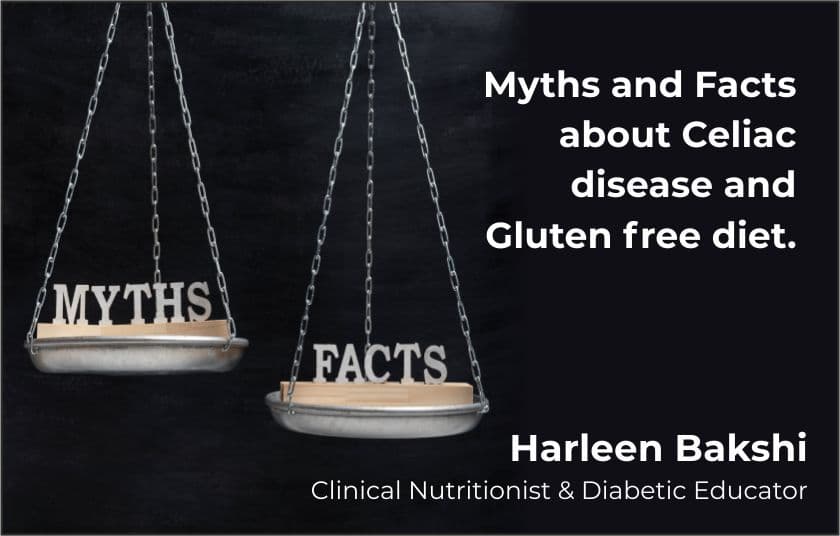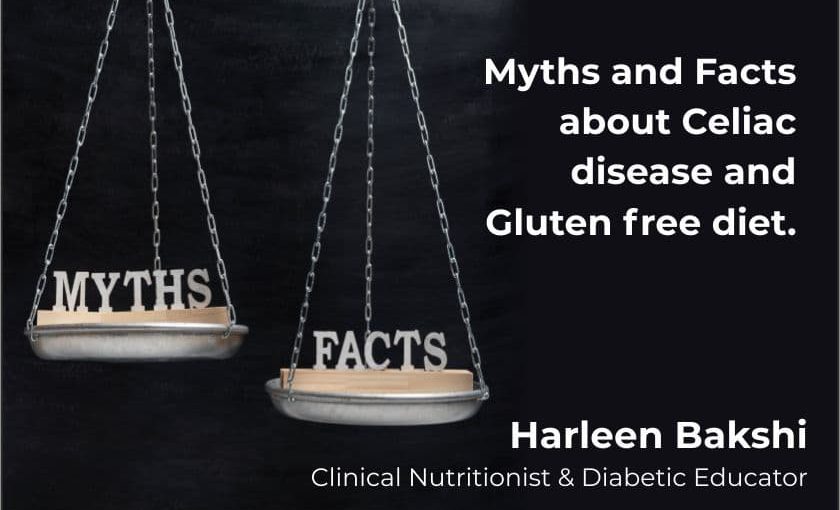Celiac Disease and Gluten-Free Diet – Myths and Facts

We all have heard of the gluten-free diet, but many people don’t even know what gluten is or that this diet is a treatment for a condition called celiac disease.
Celiac disease is a digestive condition also known as gluten-sensitive enteropathy or celiac sprue. When gluten-intolerant people consume gluten, a complex protein, they develop this complicated immune-mediated condition.
Let’s debunk a few Myths and Facts about Celiac disease and Gluten-free diet.
1. Myth: Celiac disease is merely an allergic reaction.
Fact: Celiac disease is an autoimmune disorder and not merely an allergy reaction. We misunderstood this because, like an allergic reaction, celiac disease is triggered by the presence of a foreign item in our diet. So, the only solution is to follow a strict gluten-free diet.
2. Myth: Only Children get affected with celiac disease.
Fact: Celiac disease can affect people of any age and at any age. Undoubtedly, celiac disease symptoms and conditions are more common in children, but they can also affect adults.
3. Myth: Celiac disease isn’t all that serious.
Fact: Celiac disease is a serious condition if not managed properly. Its symptoms can become severe and can lead to severe malnutrition.
4. Myth: Gluten is only found in food
Fact: Gluten can be found in a lot of unexpected places other than food. Medicine, toothpaste and cosmetics can also contain gluten. Patients should be educated to read labels properly.
5. Myth: People with celiac disease can’t eat bakery products.
Fact: They can’t eat bakery items that contain gluten, but there are plenty of gluten-free options available – both as ready-made products and as recipes you can bake yourself.
6. Myth: Celiac disease only affects our Gut.
Fact: Although gastrointestinal symptoms like diarrhoea, bloating and stomach ache are very common symptoms in celiac disease but that doesn’t mean it can’t affect other organs. It can lead to an array of other non-GI symptoms, such as itchy skin rashes, drastic weight loss, joint pain, migraines, anaemia, and fatigue. Some people may suffer from infertility and irregular menstrual periods, or experience pregnancy complications, including preterm delivery and miscarriage.
7. Myth: Restaurants offering gluten-free food can guarantee there’s no gluten.
Fact: Eating out is an extremely delicate affair for anyone with celiac disease. You want to be absolutely sure that the food on your plate is gluten-free. Unfortunately, no restaurants can guarantee there is zero gluten in the gluten-free menu items.
8. Myth: A person with celiac disease can tolerate a small amount of dietary gluten once in a while or some say that little Gluten won’t hurt.
Fact: It’s best to stay away from gluten completely. You might be able to get away with gluten occasionally in that you will appear well, but serious damage to the intestinal villi can occur even with small amounts of gluten.
9. Myth: The only dietary advice needed by a celiac is to avoid wheat and wheat products.
Fact: Effective treatment of celiac disease requires strict exclusion of gluten from the diet for life. Many foods unexpectedly contain gluten, and it’s not just in wheat but in rye, barley, oats. Due to high chances of cross-contamination), suji, couscous, etc. Always consult a registered Dietician so that you can avoid all sources of gluten and yet maintain a balanced and nutritious diet.
10. Myth: Celiac Disease and Gluten sensitivity are the same problems.
Fact: Celiac disease is an autoimmune disease, whereas gluten sensitivity is food intolerance. People with celiac disease and gluten sensitivity must avoid gluten, the way gluten reacts in their bodies is very different and both conditions must be taken seriously.


Sudhamo Bathija
Very Good piece of information on celiac.Would appreciate more information on products which contain gluten